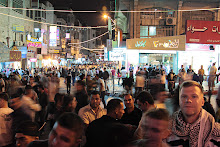As we address the details and lived experiences of people within contested Jerusalem/Israel/Palestine, and explore the setting of Jerusalem and all the multifarious complications and complexities of life there, here are three questions for Galit Hasan-Rokem:
- Jerusalem inspires a great deal of literature, reflecting deep emotions that individuals and groups invest in the city. You yourself say that "Jerusalem is my home. I love it and ache for its dead and its living inhabitants." Are these emotions, is this attachment to place, purely a function of the place being Jerusalem? In other words, why don't we see a corpus of literature (both fiction and scholarly nonfiction) about the deep attachment to and longing for, say, Nazareth? (I understand the historical, religious, and nationalist disputes at the heart of Jerusalem's contestation, but what I'm going for here is why Jerusalem has been romanticized while other places have not.)
- Following up on that, how does self-identity figure into this attachment to Jerusalem? What does it mean to have one's relationship to Jerusalem bound up into one's concept of self and belonging to place?
- Again returning to the quote above ("Jerusalem is my home. I love it and ache for its dead and its living inhabitants"), this is certainly a feeling that a great many people would feel comfortable expressing and owning. What does it mean, as Jerusalem annexes more of the surrounding area, as settlements like Ma'ale Adumim are included in the metropolitan area of Jerusalem (and Bethlehem is excluded, despite being about the same distance from the Old City), to long for Jerusalem? Are we indeed talking about the Old City and peoples' desired attachment to it? Does being a "Jerusalemite" thus give one a claim to the Old City--rather than the Knesset, or suburban West Jerusalem, etc.?
Bonus question!
- How is this longing for, and claiming of, Jerusalem delimited in time? Diaspora Jews would say at Passover seder "Next year, in Jerusalem!" Is that a claiming of Jerusalem? Before the first waves of European immigration, can we say that the local Palestinian Arabs really claimed Jerusalem , or longed for it? In other words, aren't we talking about the idea of Jerusalem, bound up in specific sacred geography, rather than the actual municipality?


No comments:
Post a Comment